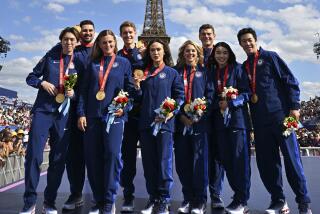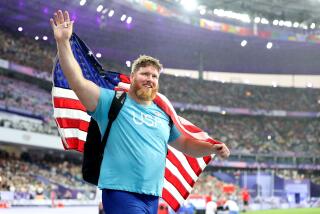Shotputter keeps U.S. streak alive with a bronze
- Share via
LONDON — Not much felt right to Reese Hoffa on a chilly evening at Olympic Stadium.
The American shotputter could not find a rhythm. His technique was off. Only one thing made him believe he could pull things together — a long stretch of U.S. success in this event.
“We continually get medals at the Olympic Games,” he said. “I wanted to be part of that tradition.”
Hoffa wasn’t good enough to unseat defending gold medalist Tomasz Majewski of Poland, who became just the second man to repeat as champion. Nor could he defeat David Storl of Germany, who took the silver.
But a bronze kept alive the U.S. streak dating to the 1984 Los Angeles Games. Now eight consecutive Olympics have had at least one American shotputter standing on the podium.
“To be part of that history,” Hoffa said, “that’s big to me.”
It was not the easiest night to be heaving a heavy ball. Not only was it cool, but the competition proceeded in fits and starts. Majewski figured the gold was up for grabs.
“We have lots of great competitors,” he said. “Now in shotput you are only sure you win after the last throw.”
His final effort was his longest, 71 feet 10 inches, just beyond Storl’s throw, a personal best of 71-83/4.
“I was very happy about my silver medal,” Storl said. “That was my first feeling and it still is.”
As for Hoffa, he reached 69-8 on his third try but could do no better. After the competition, there was a good deal of talk about his personal story.
Given up for adoption as a toddler, he landed with a family in Athens, Ga. “I’m a very lucky guy because it could have gone the other way,” he said.
The onetime football player became an All-American in track at the University of Georgia. London marked his third trip to the Olympics.
As the self-proclaimed “old-dog” in the competition, he outperformed the other Americans in the field. Christian Cantwell, a silver medalist in Beijing, finished fourth; Ryan Whiting ended up ninth.
Hoffa got himself going with a little pep talk.
“I was like, ‘Snap out of it, Reese. You’ve got to snap out of it.’”
The weight of history rested on his broad shoulders. The legacy of John Godina and Michael Carter, men who had come through in the clutch.
“It does make me part of a club,” Hoffa said. “You really haven’t done anything in the U.S. until you’ve got that Olympic medal.”
twitter.com/LATimesWharton
More to Read
Go beyond the scoreboard
Get the latest on L.A.'s teams in the daily Sports Report newsletter.
You may occasionally receive promotional content from the Los Angeles Times.







